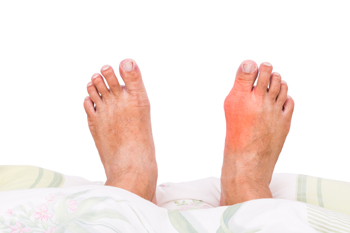
Bunions, a common foot condition, can cause significant discomfort and affect daily life. Understanding the causes behind their development is important in finding effective preventive measures and treatments. Often, bunions are inherited, as a result of genetic factors influencing foot structure and mechanics. Wearing tight or ill-fitting shoes, especially those with pointed toes or high heels, can exert pressure on the toes and contribute to bunion formation. Foot stress and overuse, commonly seen in athletes or individuals with occupations that require prolonged standing, can also aggravate bunions. Additionally, medical conditions such as arthritis may increase the risk of developing bunions. Gender plays a role, with women being more susceptible due to wearing footwear that cramps the toes. Recognizing these causes empowers individuals to make informed choices regarding footwear and foot care. If you have a bunion, it is suggested that you are under the care of a podiatrist who can help you to manage this condition, and offer potential relief options.
If you are suffering from bunions, contact one of our podiatrists of Florida Ankle & Foot Institute. Our doctors can provide the care you need to keep you pain-free and on your feet.
What Is a Bunion?
A bunion is formed of swollen tissue or an enlargement of boney growth, usually located at the base joint of the toe that connects to the foot. The swelling occurs due to the bones in the big toe shifting inward, which impacts the other toes of the foot. This causes the area around the base of the big toe to become inflamed and painful.
Why Do Bunions Form?
Genetics – Susceptibility to bunions are often hereditary
Stress on the feet – Poorly fitted and uncomfortable footwear that places stress on feet, such as heels, can worsen existing bunions
How Are Bunions Diagnosed?
Doctors often perform two tests – blood tests and x-rays – when trying to diagnose bunions, especially in the early stages of development. Blood tests help determine if the foot pain is being caused by something else, such as arthritis, while x-rays provide a clear picture of your bone structure to your doctor.
How Are Bunions Treated?
- Refrain from wearing heels or similar shoes that cause discomfort
- Select wider shoes that can provide more comfort and reduce pain
- Anti-inflammatory and pain management drugs
- Orthotics or foot inserts
- Surgery
If you have any questions, please feel free to contact our offices located in Tavernier, Marathon, and Key West, FL . We offer the newest diagnostic and treatment technologies for all your foot care needs.



